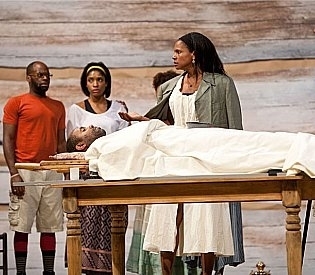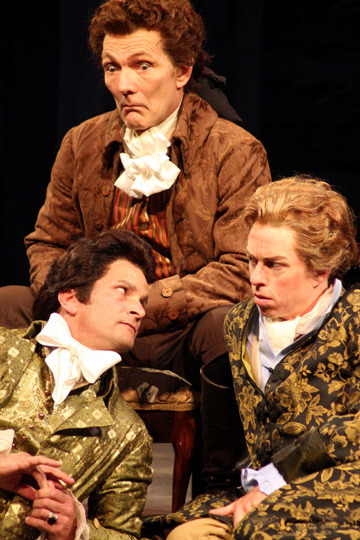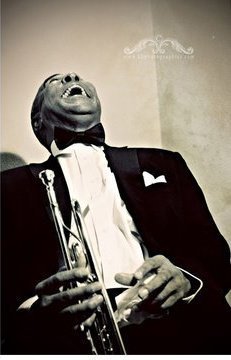Terry Teachout's Blog, page 213
September 3, 2011
THE RISE AND FALL OF THE ORIGINAL-CAST ALBUM
September 1, 2011
TT: Almanac
Leo Tolstoy, The Kreutzer Sonata
TT: Rewriting Porgy and Bess
* * *
 Stephen Sondheim pulled the pin on a jumbo hand grenade when he sent a letter to the New York Times last month in which he took issue with American Repertory Theater's Broadway-bound production of "Porgy and Bess," which opened this week in Cambridge, Mass. To be sure, Mr. Sondheim hadn't actually seen the show, but that didn't stop him from blasting the "arrogance" of Diane Paulus, the show's director, and Suzan-Lori Parks, a Pulitzer-winning playwright who has done what by all accounts is a drastic rewrite job on the book.
Stephen Sondheim pulled the pin on a jumbo hand grenade when he sent a letter to the New York Times last month in which he took issue with American Repertory Theater's Broadway-bound production of "Porgy and Bess," which opened this week in Cambridge, Mass. To be sure, Mr. Sondheim hadn't actually seen the show, but that didn't stop him from blasting the "arrogance" of Diane Paulus, the show's director, and Suzan-Lori Parks, a Pulitzer-winning playwright who has done what by all accounts is a drastic rewrite job on the book.What made Mr. Sondheim's letter possible was the fact that the creators of the new version had already discussed it at length with reporters. As Ms. Paulus explained to Playbill, their purpose in rewriting DuBose Heyward's libretto was "to strengthen the piece dramatically….filling out what's never been explored, taking the characters steps further, completing them, fully realizing them." Given the fact that "Porgy and Bess" has a long and hugely successful production history, it may come as a surprise to its admirers that it requires strengthening. It certainly surprised Mr. Sondheim: "Ms. Paulus says that in the opera you don't get to know the characters as people. Putting it kindly, that's willful ignorance. These characters are as vivid as any ever created for the musical theater, as has been proved over and over in productions that may have cut some dialogue and musical passages but didn't rewrite and distort them."
The new "Porgy" is a work in progress that will continue to be revised between now and January, when it's scheduled to open on Broadway. For this reason, the Journal has decided not to review the show until then, just as we chose not to review "Spider-Man: Turn Off the Dark" while it was still in previews. That said, Mr. Sondheim's letter set me to thinking about how and why the great Broadway musicals of the past have been revised after the fact.
Rightly or wrongly, it's become customary for a musical to undergo a fair amount of tinkering prior to being revived on Broadway. The score is usually reorchestrated for today's smaller pit bands, and it's equally common for the book to be revised. In most cases the goal of these latter revisions is to make the show more accessible to modern audiences…
"Music has a face: leave it alone. If you don't like it, don't play it; but don't change it." So said Paul Hindemith, one of the 20th century's foremost classical composers. That's what I think, too—up to a point….
* * *
Read the whole thing here .
TT: Those who cannot do...
* * *
It isn't quite right to say that nobody does "The Critic" nowadays, but Richard Brinsley Sheridan's third best-known play, written in 1779, is far less familiar to American audiences than "The School for Scandal" and "The Rivals," the two works of his that remain perennially popular. The current revival by Wisconsin's American Players Theatre appears to be the first professional production of any consequence to be mounted in this country in the past decade. Yet "The Critic" is one of the best comedies ever written, a backstage farce that offers infinite opportunity to a resourceful director and a cast of virtuoso farceurs. Fortunately, APT has both at its disposal, and William Brown has whipped up a staging whose full-tilt frenzy is strong enough to knock down a building or two.
 Mr. Puff (Jim DeVita), the play's central character, is an unashamedly venal press agent who introduces himself as "a practititioner in panegyric, or—to speak more plainly—a professor of the art of puffing, at your service, or anybody else's." He also fancies himself a playwright, and approaches the well-heeled Mr. Dangle (Darragh Kennan) and the waspish Mr. Sneer (Jonathan Smoots), a pair of opinionated connoisseurs, in the hopes of enlisting their support for his latest effort…
Mr. Puff (Jim DeVita), the play's central character, is an unashamedly venal press agent who introduces himself as "a practititioner in panegyric, or—to speak more plainly—a professor of the art of puffing, at your service, or anybody else's." He also fancies himself a playwright, and approaches the well-heeled Mr. Dangle (Darragh Kennan) and the waspish Mr. Sneer (Jonathan Smoots), a pair of opinionated connoisseurs, in the hopes of enlisting their support for his latest effort…Mr. Brown has covered Sheridan's witty cake with a thick and tasty frosting of slapstick so elaborate as to defy any attempt at accurate description. All I can tell you is that I've never laughed so hard in my life…
Sometimes a play that makes a strong first impression fails to hold up on repeat acquaintance. Not having seen "August: Osage County" since it opened on Broadway, I was eager to find out whether it was as powerful as I remembered, so I made a point of catching the Oregon Shakespeare Festival's version. I'm happy to report that it looks as good—maybe even better—the second time around, in part because Christopher Liam Moore's staging is so satisfying but mostly because the play itself is a wonderfully sound piece of work, a group portrait of collective self-loathing that is all the more devastating for using humor to make its points.
Though the original production was more than funny enough, Mr. Moore and his cast have opted for a more broadly comic portrayal of what one of the members of Mr. Letts' fictional clan describes as "the creepy character of the Midwest." If you saw Steppenwolf's version of the play, you may find this approach to be disconcerting at first, but OSF's resident ensemble never stoops to caricature, and the results are every bit as effective in their own way….
* * *
Read the whole thing here .
TT: So you want to see a show?
Here's my list of recommended Broadway, off-Broadway, and out-of-town shows, updated weekly. In all cases, I gave these shows favorable reviews (if sometimes qualifiedly so) in The Wall Street Journal when they opened. For more information, click on the title.
BROADWAY:
• Anything Goes (musical, G/PG-13, mildly adult subject matter that will be unintelligible to children, closes Jan. 8, all performances sold out last week, reviewed here)
• How to Succeed in Business Without Really Trying (musical, G/PG-13, perfectly fine for children whose parents aren't actively prudish, all performances sold out last week, reviewed here)
OFF BROADWAY:
• Avenue Q (musical, R, adult subject matter and one show-stopping scene of puppet-on-puppet sex, reviewed here)
• The Fantasticks (musical, G, suitable for children capable of enjoying a love story, reviewed here)
• Million Dollar Quartet (jukebox musical, G, off-Broadway remounting of Broadway production, original run reviewed here)
IN ASHLAND, ORE.:
• Julius Caesar (Shakespeare, PG-13, closes Nov. 6, reviewed here)
• Measure for Measure (Shakespeare, PG-13, closes Nov. 6, reviewed here)
• The Pirates of Penzance (operetta, G, suitable for children, closes Oct. 8, reviewed here)
IN WASHINGTON, D.C.:
• Oklahoma! (musical, G, remounting of 2010 production, suitable for children, closes Oct. 2, original run reviewed here)
CLOSING SOON IN EAST HADDAM, CONN.:
• Show Boat (musical, G, suitable for bright children, closes Sept. 17, reviewed here)
CLOSING SATURDAY IN GARRISON, N.Y.:
• Hamlet (Shakespeare, PG-13, reviewed here)
CLOSING SATURDAY IN LENOX, MASS:
• Romeo and Juliet (Shakespeare, G/PG-13, violence and some adult subject matter, reviewed here)
CLOSING SUNDAY IN GARRISON, N.Y.:
• The Comedy of Errors (Shakespeare, PG-13, suitable for bright children, closes Sept. 4, reviewed here)
CLOSING SUNDAY IN LENOX, MASS:
• As You Like It (Shakespeare, G/PG-13, reviewed here)
• The Memory of Water (serious comedy, PG-13, some adult subject matter, reviewed here)
CLOSING SUNDAY ON BROADWAY:
• Master Class (drama, G/PG-13, not suitable for children, most performances sold out last week, reviewed here)
August 31, 2011
TT: Almanac
Rainer Maria Rilke, Duino Elegies
August 30, 2011
TT: Almanac
W. Somerset Maugham, Cakes and Ale
TT: Snapshot
(This is the latest in a weekly series of arts-related videos that appear in this space each Wednesday.)
TT: La serenissima
 A month before I met Mrs. T, I
spent a night
in Frank Lloyd Wright's
Seth Peterson Cottage
, which is located on a bluff overlooking a lake two miles from the Wisconsin Dells and is available for short-term rentals. Not long afterward I wrote a
piece
about the experience for The Wall Street Journal. No sooner did I discover that my spouse-to-be was equally passionate about Wright's architecture than I resolved to bring her to the cottage at the earliest opportunity. It wasn't easy—you have to book your stay a year in advance—but yesterday we finally made it.
A month before I met Mrs. T, I
spent a night
in Frank Lloyd Wright's
Seth Peterson Cottage
, which is located on a bluff overlooking a lake two miles from the Wisconsin Dells and is available for short-term rentals. Not long afterward I wrote a
piece
about the experience for The Wall Street Journal. No sooner did I discover that my spouse-to-be was equally passionate about Wright's architecture than I resolved to bring her to the cottage at the earliest opportunity. It wasn't easy—you have to book your stay a year in advance—but yesterday we finally made it.I have no words to describe the feeling of tranquility that washed over us as we walked through the door of the Peterson Cottage, knowing that it was to be all ours for the next two days. Entering the cottage is like putting on a piece of exquisitely well-tailored clothing: you feel at one with the house and its surroundings, so much so that you can scarcely tell the difference between indoors and outdoors. To be sure, you wouldn't want to stay there for more than an hour or two with anyone other than the closest of companions. The two-room cottage is small—880 square feet—and the only interior door is the one that leads to the bathroom. Yet you never feel cramped, precisely because Wright took such great pains to meld the house with its site.
 Not being a student or critic of architecture, I can't say anything more informative about the design of the cottage than what Paul Goldberger
wrote about it
in 1994:
Not being a student or critic of architecture, I can't say anything more informative about the design of the cottage than what Paul Goldberger
wrote about it
in 1994:The house is Frank Lloyd Wright boiled down to his essence: Powerful geometric form; low, contained spaces played off against exuberantly high ones; a sense of natural materials put together into a composition that at once seems to hug the earth and blast off from it. From the outside, it is at once serene and energetic. A solid section of stone, barely bigger than a chimney, anchors the center. The low horizontal of the bedroom ceiling comes off from one side, and the high, raked roof of the living-dining room bursts out from the other. The solids and the voids, the lows and the highs, the horizontals and the verticals, are in harmony.
 The last word of that passage put me in mind of the exquisite lines from The Merchant of Venice that Ralph Vaughan Williams set in his Serenade to Music: Here will we sit and let the sounds of music/Creep in our ears: soft stillness and the night/Become the touches of sweet harmony. As my beloved spouse and I sat in the soft stillness of the Wisconsin night, we felt the sweet harmony of the Peterson Cottage, in which the built and natural worlds resonate in perfect concord.
The last word of that passage put me in mind of the exquisite lines from The Merchant of Venice that Ralph Vaughan Williams set in his Serenade to Music: Here will we sit and let the sounds of music/Creep in our ears: soft stillness and the night/Become the touches of sweet harmony. As my beloved spouse and I sat in the soft stillness of the Wisconsin night, we felt the sweet harmony of the Peterson Cottage, in which the built and natural worlds resonate in perfect concord.Careworn and road-weary though we both are, I doubt that Mrs. T and I have ever been much happier than we are today.
* * *
Sir Henry Wood conducts the BBC Symphony in the first recording of Serenade to Music:
TT: The man within
 Yes, I wrote both the script of the play and the
biography
on which Satchmo at the Waldorf is loosely based, and I think that I have a pretty good understanding of what made Louis Armstrong tick. Like everyone who knew him, I find his character to be wholly sympathetic, and I believe that my experience as a working jazz musician has given me a solid grasp of the wellsprings of his artistry. That said, I wouldn't claim to identify with Armstrong in anything more than a superficial way, if only because our lives were so very diffferent. I come from a middle-class family and was born and raised in a small Missouri town. Armstrong was born in black Storyville, the roughest part of turn-of-the-century New Orleans, and was raised by a part-time prostitute. What's more, Mayann Armstrong was a single mother, for her son's natural father deserted him when he was a baby.
Yes, I wrote both the script of the play and the
biography
on which Satchmo at the Waldorf is loosely based, and I think that I have a pretty good understanding of what made Louis Armstrong tick. Like everyone who knew him, I find his character to be wholly sympathetic, and I believe that my experience as a working jazz musician has given me a solid grasp of the wellsprings of his artistry. That said, I wouldn't claim to identify with Armstrong in anything more than a superficial way, if only because our lives were so very diffferent. I come from a middle-class family and was born and raised in a small Missouri town. Armstrong was born in black Storyville, the roughest part of turn-of-the-century New Orleans, and was raised by a part-time prostitute. What's more, Mayann Armstrong was a single mother, for her son's natural father deserted him when he was a baby.So while I do think that I understand Armstrong reasonably well, I can't even begin to know what it would have felt like to be him. Not so Dennis. To be sure, he wasn't born in black Storyville or raised by a whore, but he's seen things that I've only read about in books, and my guess is that this will give him a kind of access to Armstrong's interior life that I can only attempt to simulate from the outside in.
 What makes all this so important is that Dennis' job is to get up in front of an audience and embody Armstrong. I did a certain amount of acting in my youth, and though I wasn't particularly good at it, I do know what it feels like to play a part. It's nothing like putting on a mask: you have to meld with the character you're playing, using elements of your own experience to bring his personality to life.
What makes all this so important is that Dennis' job is to get up in front of an audience and embody Armstrong. I did a certain amount of acting in my youth, and though I wasn't particularly good at it, I do know what it feels like to play a part. It's nothing like putting on a mask: you have to meld with the character you're playing, using elements of your own experience to bring his personality to life.Because I'm so closely acquainted with Armstrong's habits of speech, I was able to write dialogue for for him that sounds natural, and I think I was also able to create a "voice" for Joe Glaser that is equally convincing. (It helped that I was able to listen to an informal radio interview with Glaser that was taped off the air in the Fifties, the only surviving recording of his speaking voice.) I can assure you, however, that none of the dialogue in Satchmo at the Waldorf sounds at all natural when I read it out loud, and I expect you'd be reduced to helpless laughter were I to stand up in front of you and try to act out a scene from the play. But having watched Dennis perform the first forty-five minutes of Satchmo at the Waldorf in a workshop performance earlier this year, I haven't the slightest doubt that the only time he'll make the audience laugh is when he's supposed to do so.
I hasten to point out that Dennis isn't going to be impersonating Armstrong or Glaser. That's not what I want. As I explain in the stage directions:
The roles of Louis Armstrong and Joe Glaser are played by the same actor. He need not resemble either man physically and should suggest Armstrong's voice rather than imitating it.
"I don't want you to be Rich Little doing Satchmo," I said to Dennis when we met for the first time back in February. "I want you to be an actor. I want you to create your Armstrong and your Glaser."
"That's just what I wanted to hear," he replied with a smile. And it's just what I expect to see when I fly down to Orlando next Saturday and sit in on my first rehearsal of Satchmo at the Waldorf.
Terry Teachout's Blog
- Terry Teachout's profile
- 45 followers



